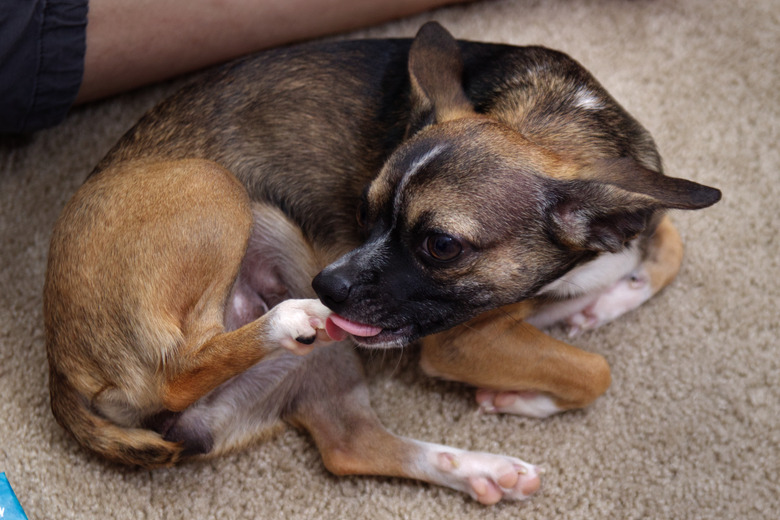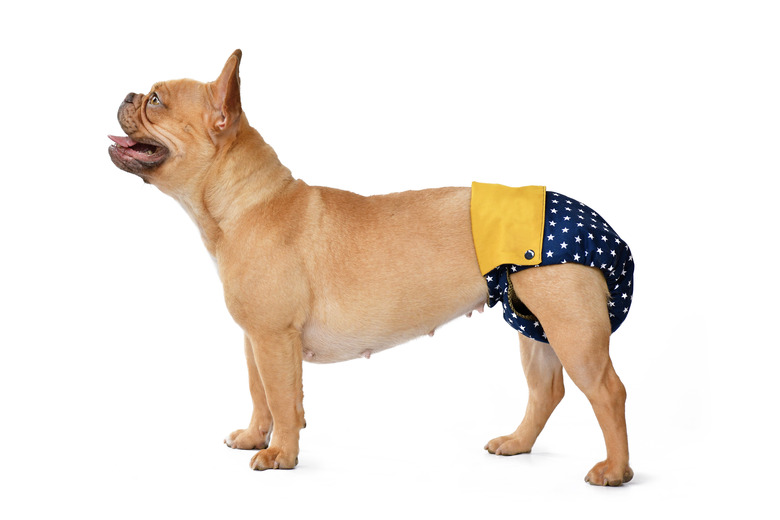Urinary Incontinence In Dogs: Symptoms, Causes & Medication
Canine urinary incontinence (as opposed to fecal incontinence), the primary cause of night urination and many household accidents, is a treatable condition. Don't assume that night urination or any case of your dog peeing when or where they're not supposed to is the result of poor potty training, behavioral issues, or a transient issue that will resolve itself. We spoke with Dr. Shagufta Mulla, a veterinarian with a DVM degree from Colorado State University with 20 years of experience as a small animal veterinarian, to find out more about urinary incontinence in dogs.
A veterinarian should examine your dog to rule out anything from bladder infections to serious illness and to help you create a plan for dealing with this problem. Urinary incontinence is manageable and doesn't have to keep your dog from enjoying a happy and high-quality life.
What is an incontinent dog?
What is an incontinent dog?
An incontinent dog is one who's unable to control their bladder for one reason or another, leading to the involuntary passing of urine. This can happen at any time, not just at night and not just while sleeping.
The dog's bladder holds urine, which passes through and exits from a small membranous tube called the urethra when a dog urinates. "Most cases of incontinence are in females," says Dr. Mulla. "Urinary incontinence in females may be caused by a weakness of their urethral muscle, also known as sphincter mechanism incompetence. Urinary incontinence in males is often due to their inability to properly empty the bladder."
In involuntary night urination, sleeping dogs are relaxed, as are all of the muscles involved with bladder control. This can allow urine leakage from the bladder in varying amounts. "Senior dogs are deep sleepers, and because their urethral muscle may weaken over time, this condition occurs more frequently in middle-aged to older spayed female dogs, though dogs of any age can develop it," says Dr. Mulla.
Symptoms and signs that your dog is incontinent
Symptoms and signs that your dog is incontinent
Signs of involuntary night urination include wet spots or puddles on a dog's bed, the floor, or the carpet. "Even the couch," says Dr. Mulla. Basically, a small amount of urine can puddle up wherever your dog sleeps. Dog owners may also notice that their dog is damp upon waking, usually around the lower area of their body.
Symptoms include irritated skin and stained fur around the dog's genitals and constant licking and cleaning of the vulva or penis. Urine scald is similar to diaper rash and just as uncomfortable, so it's important for pet owners to keep their dogs and dog sleep areas clean.
You can clean off your dog's skin and fur using baby wipes between baths. Aloe vera gel combined with witch hazel can soothe irritation and provide antiseptic protection.
Common causes of urinary incontinence in dogs
Common causes of urinary incontinence in dogs
Urinary incontinence in dogs may result from aging, hormonal insufficiency, or more serious medical problems in both male and female dogs. As some female dogs get older, involuntary urination may be triggered by a condition called estrogen-responsive incontinence or spay incontinence. "This happens in aging female dogs due to reduced estrogen levels," says Dr. Mulla. Reduced natural production of estrogen is also reduced in spayed dogs, and can weaken sphincter muscles, leading to incontinence.
Prostate issues can also cause urinary incontinence, as can medications like corticosteroids, which increase the frequency and urgency of urination. Make sure to speak with your veterinarian to rule out these possibilities.
A thorough exam by your dog's veterinarian can determine whether the diagnosis is hormone-related incontinence or another medical condition, such as a urinary tract infection, diabetes, kidney disease, bladder stones, Cushing's disease, neurological problems, or abnormalities of the genitalia.
Medication for dogs suffering incontinence
Medication for dogs suffering incontinence
Over the years, many drugs with varying levels of success, safety, and side effects have been used to help control incontinence that's not caused by a serious illness. The most common medications for treating female urinary incontinence is hormone replacement therapy with estrogen, including estradiol, a more natural form of estrogen, and phenylpropanolamine, a drug that strengthens the urethral sphincter muscle and reduces uncontrolled urination. "In some situations, like male dogs with urinary incontinence, smooth muscle relaxants, skeletal muscle relaxants, or both may be used," explains Dr. Mulla.
"Dogs can have worsening incontinence when stressed or anxious," Dr. Mulla says. When this is the case, anxiety medications may be prescribed. "Dogs that don't respond to medication should be evaluated for other lower urinary tract diseases, and some may even benefit from surgical intervention," explains Dr. Mulla.
Your veterinarian is the best person to diagnose the cause of your dog's incontinence and prescribe the appropriate medication. Do not give your dog any drugs, supplements, or remedies before consulting with your veterinarian.
Palliative care for your dog
Palliative care for your dog
Products created especially for households dealing with canine incontinence can make life more comfortable for dogs and their family. For example, it's unhealthy for a dog to sleep on a wet, urine-soaked bed or sleeping surface, so special dog beds are available for dogs with incontinence. Other products include urine cleaning supplies, dog diapers, and training pads that soak up urine but leave a dry surface for your dog to sleep on.
The bottom line
The bottom line
If you see piddles of urine wherever your dog sleeps, it could be canine urinary incontinence. This is the primary cause of night urination and many household accidents. Pet parents should know that it is a treatable condition., but it won't go away on its own. Our expert, DVM Dr. Shagufta Mulla, says leaking urine that worsens with stress or anxiety could improve with medication. A veterinarian should examine your dog to rule out infections or illness and to help you create a plan for dealing with urinary incontinence.

